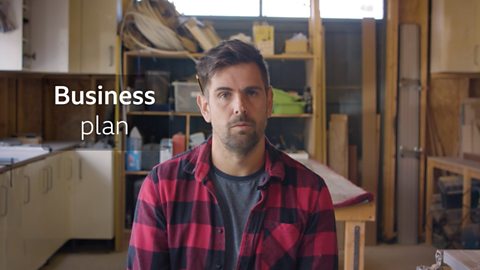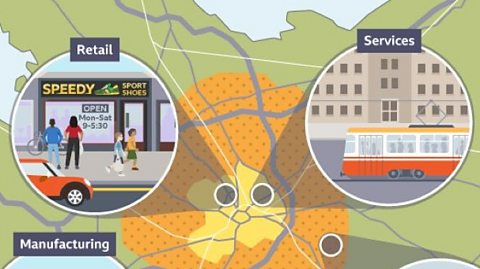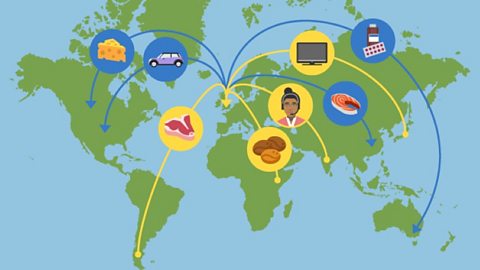Exam techniques
Exam techniques - Eduqas
Learn techniques for taking your GCSE Business exam with example questions, answers and case studies.

Business activity
The nature of business activity - Eduqas
There are many aspects to running a business. Businesses must consider competitors, the market, opportunities, a range of data type and business calculations.

Providing goods and services - Eduqas
Businesses exist to provide either a good or service to consumers and the general public. These products are sold by either public or private sector businesses.

Business enterprise - Eduqas
Entrepreneurs set up businesses for a variety of reasons. Ultimately however, successful businesses survive by meeting customer needs. Entrepreneurs must have a range of characteristics and motives to create a successful business.

Business planning - Eduqas
Learn about the importance of business planning with ґуПуґ«ГЅ Bitesize GCSE Business – Eduqas.

Business aims and objectives - Eduqas
All businesses create aims and objectives to give them goals or targets to achieve. Businesses have a range of stakeholders that are all impacted in some way by aims and objectives.

Business ownership - Eduqas
There are a number of different options when setting up a new or small business. These may depend on the size of the business, the number of owners and the level of risk owners are willing to take.

Business growth - Eduqas
Business growth is important as it enables businesses to increase the scale of their operation and competitiveness. This may be done either internally (organically) or externally (inorganically).

Business location and site - Eduqas
Business owners have to consider a number of things when choosing a location for their business. These include the type of business and how close they need to be to their customers, labour, materials and competitors.

Influences on business
Technological influence on business activity - Eduqas
The speed at which technology advances is getting faster. Businesses need to be aware of the technology that is available to them, and how it might influence their sales, costs and marketing.

Ethical and environmental influence in business - Eduqas
Businesses are increasingly judged on the contribution they make to society. Behaving ethically, without harming the environment, is an important part of this corporate social responsibility.

Economic influence on business activity - Eduqas
The economic climate has a big impact on businesses. The level of consumer spending affects prices, investment decisions and the number of workers that businesses employ.

The impact of globalisation on businesses - Eduqas
In business, globalisation means operating on an international scale to provide or produce goods and services. Almost all of the goods we use are made of parts sourced from around the world.

The impact of legislation on businesses - Eduqas
The government use legislation to regulate businesses’ behaviour and prevent them from exploiting people. Laws protect consumers who buy from businesses and workers employed by businesses.

Business operations
Methods of production - Eduqas
Businesses compete with rival businesses. Production costs must be kept low so that products can be priced competitively. The ability to do this is affected by production methods and technology.

Quality - Eduqas
Quality is essential to a business’ success. Customers must be happy with the products and services they receive. If they are not, a business is unlikely to gain a good reputation or repeat customers.

Supply chain - Eduqas
The supply chain is related to how businesses produce goods and services. It also considers how they are distributed to customers in the most cost effective, high quality way.

Sales process - Eduqas
The sales process involves the steps and processes a business must take in order to be successful in selling its goods and services, both offline and online.

Finance
Sources of finance - Eduqas
Businesses need to consider how they will fund their activities when starting up as well as their day-to-day operations. Various costs need to be covered, such as equipment, stock and paying bills.

Revenue and costs - Eduqas
Financial terms and calculations includes revenue, costs, profits and loss, average rate of return, and break even. These financial elements inform key decisions in every business.

Profit and loss accounts - Eduqas
It is important to understand the difference between gross and net profit. Knowing the gross profit margin, net profit margin and average rate of return is essential when making business decisions.

Cash-flow - Eduqas
The management of cash and cash flow is important as it can prevent a business from failing. Cash flow is the way that money moves in and out of a business and its bank accounts.

Marketing
Identifying and understanding customers - Eduqas
It is very important for a business to identify and understand their customers. Businesses use a process called segmentation to help them achieve this.

Market research - Eduqas
When businesses are deciding how to develop their products and services, they undertake market research. Market research can either be done by the company itself or taken from elsewhere.

The marketing mix - Eduqas
The four elements of the marketing mix provide businesses with information that helps them to make decisions about their target market and the image they want to convey.

Product - Eduqas
It is easier to sell products designed with the needs and wants of customers in mind. As needs and wants change, businesses must update or replace products that no longer satisfy customers.

Price - Eduqas
Price often influences purchasing decisions, so getting it right is important. Price too high and consumers will not purchase, price too low and there is a risk that the business will make losses.

Promotion - Eduqas
Promotion is a key part of marketing, helping to inform and persuade consumers about products. Promotional activity can be expensive, so it is important that choices are made wisely.

Place - Eduqas
Customers are less likely to buy products that are difficult to find or frequently unavailable. Therefore, getting products to the right place is an important part of the marketing mix.

Human resources
Recruitment - Eduqas
Businesses have many different roles and responsibilities. When recruiting to fill a vacancy, a business must decide whether to recruit internally or externally, and complete relevant documentation.

Training - Eduqas
Training and development are important for businesses. They help businesses to ensure their employees are able to perform well, reach their potential and stay motivated.

Motivation - Eduqas
Motivation determines how hard employees are willing to work for a business and how productive a business is. A business can motivate its employees through financial and non-financial methods.

Organisational structures - Eduqas
Businesses use organisational structures to illustrate job roles and responsibilities. Organisational structures show who each employee reports to in their job.

The interdependent nature of business - Eduqas
Business are often split into different departments that depend on each other to achieve success. The more closely the departments work together, the higher the chance of success.

Links
- External linkExternal link
- External linkExternal link
- External linkExternal link
- External linkExternal link
- SubscriptionSubscription